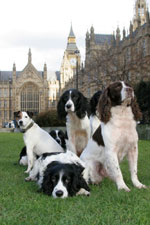 BASC is calling on Defra to leave in place tapeworm controls for dogs entering the UK in a bid to prevent the arrival of a parasite which causes a disease potentially fatal to humans.
BASC is calling on Defra to leave in place tapeworm controls for dogs entering the UK in a bid to prevent the arrival of a parasite which causes a disease potentially fatal to humans.
If Defra agrees to continue with the controls, it will help keep the UK free from the Echinococcus multilocularis tapeworm.
The tapeworm is principally caught by accidentally ingesting eggs from the faeces of infected dogs and foxes, putting gamekeepers and shooters at particular risk. Infection can go undetected for a decade – by which time internal organs are so badly damaged that up to 94 per cent of patients will die.
BASC made its recommendations to Defra in its response to a recent consultation on a review of the Non-Commercial Movement of Pet Animals Order 2011 (as amended).
Dr Conor O’Gorman, BASC’s policy development manager, said: “This is a matter of life and death. The worming controls are our first line of defence in the face of a clear and present danger. All it takes to get infected is to accidentally ingest tapeworm eggs spread onto vegetation or fruit from dog or fox faeces.”
BASC believes the pet travel scheme has worked well in preventing rabies and the tapeworm coming into the UK from the EU and third countries while still allowing the movement of pet cats, dogs and ferrets.
Dr O’Gorman added: “The incidence of rabies in continental Europe has significantly reduced, but the incidence of the tapeworm Echinococcus multilocularis seems to be on the increase, with approximately 300 cases per year reported in humans.
“BASC is particularly concerned about the risk of tapeworm Echinococcus multilocularis entering the UK fox population, given that those who shoot and work in the countryside, or own dogs, are all key risk groups.
“We believe that the order is still required and recommend that control measures for rabies and the Echinococcus multilocularis tapeworms are maintained.”
Ian Grindy, a member of BASC Council and chairman of its game shooting and gamekeeping committee, said: “Many of our members have dogs and are countryside users so this is a very important issue for us. We will keep a close eye on the situation.”
In 2011, BASC lobbied Defra on behalf of its members to ensure that the UK’s pet movement controls would remain in place and wrote to then Environment Secretary Caroline Spelman setting out its concerns. BASC also raised the issue in the House of Lords.
In Northern Ireland, BASC members assist the Department of Agriculture, Environment and Rural Affairs with the collection of fox carcasses for testing as part of the UK’s surveillance scheme for presence of the tapeworms.